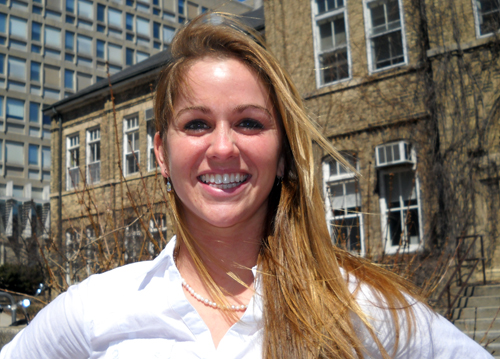
Even when you study learning and memory, you can forget or misplace the odd thing, says Krista Mitchnick.
“I can’t remember things if they’re not put in the same place, such as my iPod or cellphone,” says the U of G master’s student in psychology. “I might forget meetings, appointments or due dates unless I write them down.”
Whether it’s her foibles or someone else’s, Mitchnick is fascinated by how we learn and remember things. Maybe just as intriguing is what happens when memory fails, she says.
Teasing out the molecular and cellular workings of learning and memory is the goal of her research with psychology professor Boyer Winters. She hopes her studies will help people with degenerative memory disorders such as Alzheimer’s or dementia as well as seniors coping with general age-related memory problems.
What genetic and environmental factors affect learning and memory? It’s that old nature-versus-nurture question applied to the mysteries of the mind.
She looks at epigenetics, meaning “on top of genetics.” That refers to changes to DNA that alter expression of genes. These changes are triggered by environmental factors such as diet, drugs and disease.
For instance, studies have shown that the behaviour of rat pups changes when their mothers are stressed somehow. Environmental factors filter through to change hormone levels in the young.
Might a similar thing happen in learning and memory? Maybe expressing or silencing a gene – or entire groups of genes – helps determine whether a memory is created or not.
Mitchnick uses rats to connect brains and genes. In the lab, she moves objects among locations to see how rats learn and to see what happens to their memory when she inhibits epigenetic mechanisms in different brain regions.
She has found that memory involves these epigenetic mechanisms sometimes in only one brain area and at other times in more than one region. That difference might reflect the brain’s ability to create new neurons in some places but not in others.
Creating new neurons helps in making long-term memories. But that process may be hampered in people with neurodegenerative disorders such as Alzheimer’s or even as people age normally. That might make it difficult for people to hold episodic memories.
For example, she says, dementia didn’t prevent her grandmother from remembering how to read the label on an infusion bag in the hospital. But her grandmother needed repeated prompting about when someone planned to visit her next.
Maybe, says Mitchnick, these problems stem from missed epigenetic connections between environmental factors and the genes that produce proteins needed to make neurons and new memories.
“I’ve always been interested in learning and memory. Who are we without our memories?”
That interest goes way back to growing up in Orangeville, Ont.
She was eight years old when she decided to do grad studies one day. That decision came after she asked her mom: What’s a PhD?
Her mother, Mary Sue Crawford, a clinical psychologist, had done a doctorate at the University of Alberta. “She explained what a PhD was, and I said, ‘I’m going to do that.’”
Her dad, Robert Mitchnick, completed a master’s degree at the University of Waterloo and is also a clinical psychologist.
Mitchnick completed her undergrad in psychology at Guelph in 2012. Her brother, Scott, is in his third year of environmental governance here. She quips, “I’m going to save people’s minds, and he’s going to save the world.”
In the classroom, she uses such tools as acronyms to learn detailed information such as neuroanatomy and structure. She also uses visual and even kinetic cues.
For this long-time dancer and former member of the U of G Gryphon Dance Pak, memorizing a short presentation is much like learning a choreographed routine in the studio.
This month, she will compete in a province-wide three-minute thesis contest at Queen’s University as one of two U of G finalists. In March, she received a travel grant for a conference in Belgium this spring to be held by the International Behavioural and Neural Genetics Society.